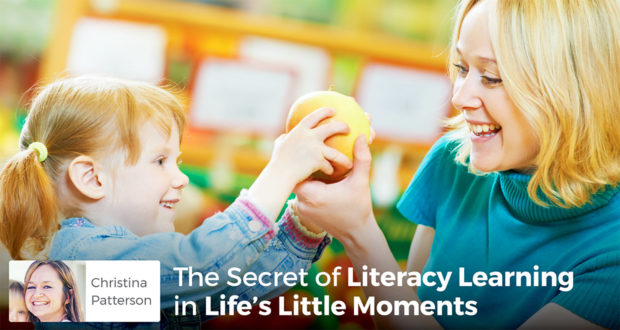Summary
Christina Patterson holds that literacy can be found in everyday activities and moments and that we can teach literacy learning through the “little things”.From my years as a teacher, I was used to envisioning literacy lessons through the perspective of carefully thought out plans.
Some of these plans took hours to devise and were the product of hours of collaboration with the rest of my grade level team. But as the parent of a young literacy learner, I’ve recently realized that literacy can—and should—also be embedded in life’s everyday activities and moments.
In other words, as parents, we can promote literacy learning through the “little things.”
Why is this important? Are impromptu literacy lessons to be valued above structured plans to teach? Certainly not!
Literacy plans are critical to reading success for many reasons, not least of which that a good planning framework assists teachers and parents in making sure that important skills aren’t overlooked. Such a framework also helps skills naturally progress in difficulty.
This helps students develop strong foundational skills before moving on to those that increase in complexity.
However, taking advantage of the “teachable” moment has tremendous worth as well.
A teachable moment simply means that the opportunity for learning spontaneously presents itself, without having been planned ahead of time. As parents, we can seize upon these moments instead of letting them pass us by; we can utilize these moments for learning.
In my experience, these moments often appear in one of two ways. The child, who asks an insightful question just begging to be turned into a quick lesson, may initiate a teachable moment. An example of this might be a child who, while in the grocery store, recognizes a letter on a sign.
If he sees the letter “p” in the word “potatoes”, and asks if that is the letter “p”, perhaps seizing upon the teachable moment can be as easy as saying, “Yes! Do you know what sound that letter makes?” Or, you might make a game of searching for other “p” vegetables in the produce section.
The second way that teachable moments present themselves usually starts with us. One way involves the child’s interests. As parents, we spend a great deal of time with our children, and as such, are uniquely privileged to know about their favorite colors, toys, books, and characters (for the moment, that is, as they may all change by tomorrow!).
Sometimes, while playing with my daughter and her favorite toys, I’ll ask her to sort them into categories by color. Or, I’ll write the names of the characters and ask her if she can identify the letter that begins each name.
The ideas are endless. There are so many moments where, with a little creativity, literacy can be promoted “on the fly,” so to speak. Consider going on a scavenger hunt for certain letters on cereal boxes or menus, or pointing out letters on signs while traveling along in the car.
You might sort favorite toys by initial sound of each toy’s name, or sort them by color, and then identify the sound at the beginning of the color word.
You might play a game of “I Spy” with letters. This is a unique invention of my daughter’s, and I saw it as a teachable moment. She will say, “I spy something that starts with “s”!” Sometimes she says the letter, and sometimes she will say the sound of a letter.
Now, there are many times when the item she spies does not, in fact, start with the letter or the sound, which is where the teachable moment comes in. For example, if she claimed that “curtain” was the “s” item she spied, I can say “curtain”, emphasizing the initial sound, /k/.
Then, I can continue, “This starts with a letter “C”, same as in “cat”! “C” can make a /k/ sound. Do you hear the /k/ sound in “curtain”? What other items around here can you find that start with that /k/ sound?”
Later, I’ll also circle back to the /s/ sound and point out an example of an item that starts with /s/, before asking her to help me find another. In this way, the game continues, and the child learns in a positive way, so that she is encouraged to try again.
Venturing on a nature walk can also lead to teachable moments. This can involve another game of “I Spy,” with the aim of identifying nature words by their initial sounds.
Another fun modification is to mimic any bird or insect sounds or even animals such as dogs barking, or, if you are on a farm, the sound of cows mooing and horses neighing. Ask your child what letter sounds he or she hears in the particular nature sound.
For example, the child may identify the /m/ sound from a “moo” and an /r/ or /w/ sound from the “ruff” or “woof” of a dog!
These ideas concern themselves with phonemic awareness, which is the ability to distinguish phonemes, the individual sounds of words. Many of the ideas would also transition smoothly into the area of phonics, which involves the letter-sound relationship.
In other words, phonics involves an understanding of which sounds are represented by which written letters.
There are also many ways to further extend the learning of the teachable moments by delving into the realms of comprehension and vocabulary, too. While reading favorite stories, you might ask your child questions about the characters, such as how the characters might be feeling, or what your child thinks will happen next in the story.
You might also spend a little time explaining words that your child is not familiar with that come up either in stories or conversations.
Using the word in different sentences and contexts throughout the day are wonderful ways to ensure the five to seven relevant repetitions that usually are required for new word learning to occur.
The ideas are limitless as to how you can seize the teachable moment today!
Header photo CC Kadmy | adobestock.com

 Seton Magazine Catholic Homeschool Articles, Advice & Resources
Seton Magazine Catholic Homeschool Articles, Advice & Resources

